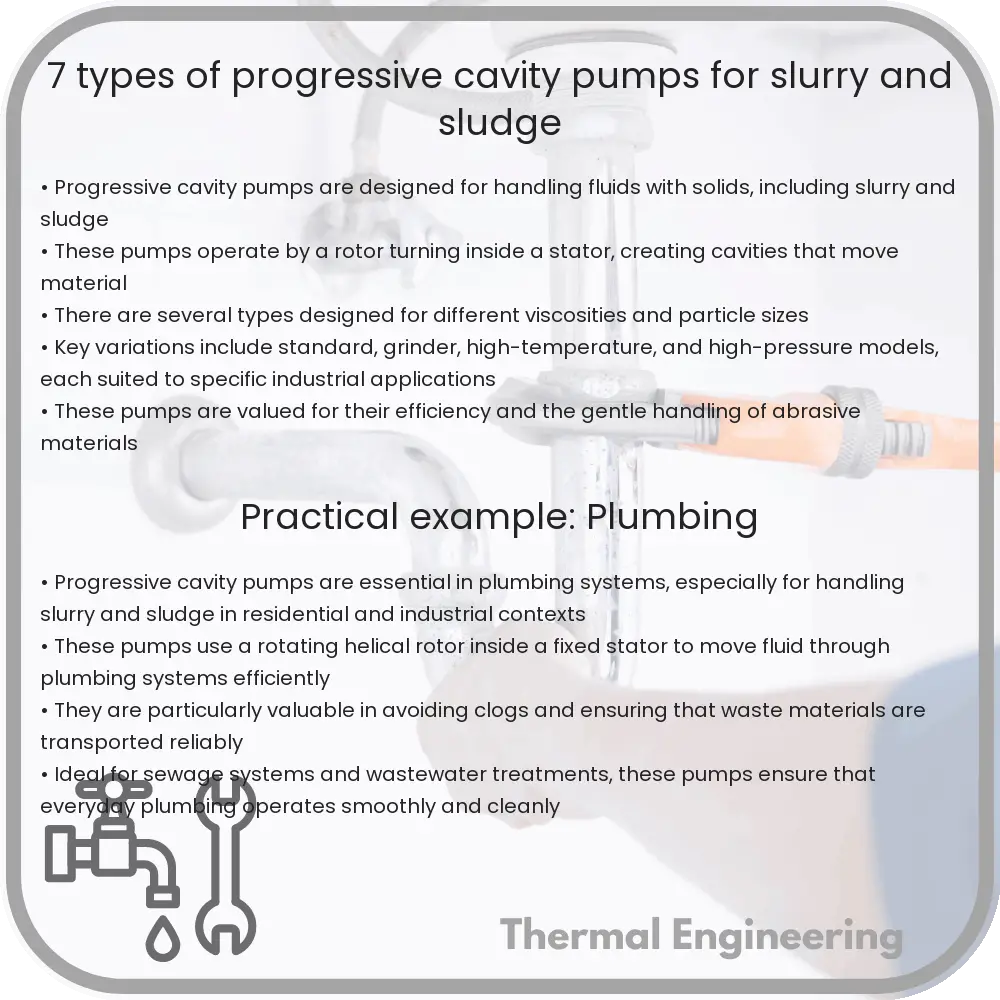Learn about the various types of progressive cavity pumps used for efficiently handling slurry and sludge in different industrial applications.

Understanding Progressive Cavity Pumps for Slurry and Sludge Handling
Progressive cavity pumps (PCPs), also known as single screw pumps, are widely used in the handling of fluids with challenging properties, such as slurry and sludge. They operate on a simple yet effective mechanism that allows them to handle thick, abrasive, and solid-filled materials without degradation of the pump or the material. Below, we explore seven common types of progressive cavity pumps designed to effectively manage slurry and sludge in various industrial applications.
1. Standard Progressive Cavity Pumps
Standard PCPs are the most basic form of this pump type, consisting of a single helical rotor that turns inside a double helical stator. They efficiently handle media with varying viscosities and solids content, making them suitable for applications in wastewater treatment, mining, and food processing.
2. Wide Throat Progressive Cavity Pumps
Designed with a wider inlet, wide throat pumps are specifically engineered to handle highly viscous slurry or sludge with a high concentration of solids. The enlarged throat and auger feed in the inlet of the pump efficiently convey the thick media into the pumping elements.
3. Grinder Progressive Cavity Pumps
These pumps incorporate a grinding mechanism at the inlet, which breaks down large particles or fibrous materials before they enter the pumping elements. Grinder PCPs are ideal for applications where downstream equipment may be sensitive to particle size or when processing waste containing large solids or tough materials.
4. Dosing Progressive Cavity Pumps
Dosing pumps are specialized for precise metering and dosing applications. With their tightly controlled flow rates and high precision, these pumps are particularly useful in chemical, pharmaceutical, and scientific research industries where exact volumetric flow control is essential.
5. High-Temperature Progressive Cavity Pumps
These pumps are constructed with materials capable of withstanding elevated temperatures, enabling them to handle hot slurries and sludge from industrial processes such as steel manufacturing or chemical processing. High-temperature PCPs maintain their integrity and performance even in challenging thermal environments.
6. High-Pressure Progressive Cavity Pumps
High-pressure variants are designed to operate under significant hydraulic pressures, suitable for deep-well operations, high-pressure oilfields, or construction sites where lifting fluid from great depths is necessary. Their robust construction ensures efficiency and durability under high-pressure conditions.
7. Sanitary Progressive Cavity Pumps
These pumps are utilized primarily in the food, beverage, and pharmaceutical industries where hygiene standards are stringent. Sanitary PCPs are manufactured with food-grade materials and designed for easy cleaning and maintenance to prevent any risk of contamination.
Choosing the Right Progressive Cavity Pump
When selecting a progressive cavity pump for handling slurry or sludge, factors such as the nature of the material (viscosity, abrasiveness, particle size), the required flow rate, pressure, and the specific industrial environment should be carefully considered. Each type of PCP is tailored to meet different specific needs, ensuring optimal performance and longevity. Proper pump selection not only guarantees efficient handling of challenging materials but also reduces maintenance costs and enhances overall process reliability.
In conclusion, understanding the specific requirements of your application can help in choosing the correct type of progressive cavity pump, thereby ensuring effective and efficient handling of slurry and sludge in various industries.